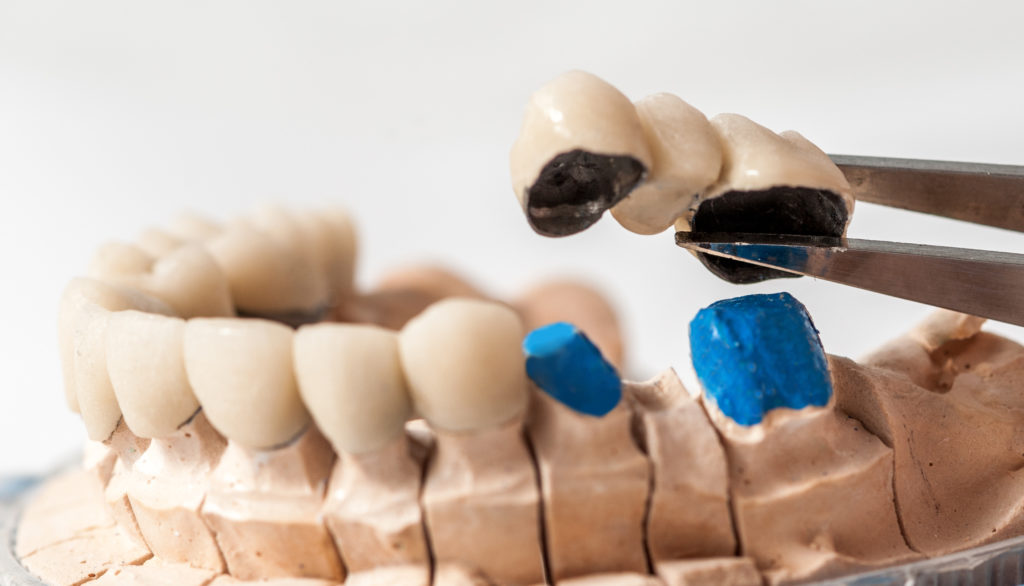
Conventional bridges offer a tooth replacement solution for one or a few consecutive missing teeth. However, there are several reasons that these restorations may not be ideal for every patient, including the potential for the supporting teeth to be damaged, decayed, or infected. In this blog, we’ll walk through some of the possible ways that traditional bridges can fail, how our team can repair these restorations, and what alternative restorative dentistry options are available.
What is a Bridge and How Teeth Below a Bridge May Become Infected
A conventional bridge is a series of crowns that are fused together to replace a missing tooth or teeth. In order for this to be possible, there needs to be at least one tooth on either side of the missing tooth space. The fused crowns allow for a crown(s) to be positioned in the empty tooth space that provides the function and cosmetics of having the missing tooth replaced.
It is essential to practice proper and routine dental hygiene to maintain bridges due to plaque and bacteria building up underneath the bridge where the missing tooth or teeth are. The lack of maintaining a bridge properly clean can allow for this build up to compromise the adjacent teeth that are serving as “anchors” for the bridge. Once decay starts at the margin of the bridge due to lack of proper dental hygiene, it then can progress under and inside of the crowns that make up the bridge. If the decay is detected and treated before it reaches the nerve of the tooth, the bridge may simply need to be replaced. However, if the decay reaches the nerve, then the tooth can become infected and an abscess can develop. If there is enough healthy tooth structure, then root canal treatment may be required to save the tooth. However, if there is limited healthy tooth structure, then the tooth may need to be replaced with an implant.
Other Common Problems with Fixed Bridge Restorations
In addition to infection or decay damaging the tooth under a conventional bridge, patients with a bridge may also experience the following problems that require the restoration to be repaired or replaced:
- Bad breath – Due to a lack of proper dental care and hygiene, bacteria trapped between the bridge and your healthy teeth or gum tissue can produce a waste byproduct that has a malodor.
- Bite misalignment – If the bridge isn’t designed and cemented properly, your bite may not fit together properly. This can lead to jaw joint strain and unconscious teeth grinding and clenching that leaves your smile open to damage.
- Tooth sensitivity – Likewise with bite misalignment, if the bridge is improperly designed or cemented, the strain or extra forces placed on the serving “anchors” of the bridge can lead to dental sensitivity.
Benefits of Dental Implant Supported Tooth Replacement
Because of these potential problems associated with fixed bridge tooth replacement, it may not be the ideal option for every patient. Instead of a traditional fixed bridge, we can offer dental implant supported dental crowns or bridges that restore both the roots and crowns of lost teeth and don’t rely on surrounding teeth for support. Some of the many benefits of implant supported tooth replacement include:
- Protecting healthy remaining teeth from unnecessary strain or damage
- Keeping supportive bone and gum tissue healthy
- Maintaining the natural bite alignment
- Lasting two decades or longer compared with traditional fixed bridges that may need to be replaced in seven to ten years
Meet the McCarl Dental Group Team
Families in Greenbelt, MD have trusted the McCarl Dental Group team with their oral healthcare needs since 1924. The skilled dentists and knowledgeable dental care team in our Greenbelt dental office always go the extra mile to keep our patients smiling. When you’re ready to experience the McCarl Dental Group difference, contact our dental team today. We are happy to offer a full range of tooth replacement and restorative dentistry solutions to renew oral health following dental damage or decay.
